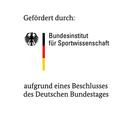Speed, acceleration, total distance, rotational speed and activity – what coaches previously only observed visually is now being measured using sensors and recorded with reliable data. “The sheer volume of data and its analysis is something unprecedented in German Paralympic sport,” says Prof. Fuss. The data collected can be used to measure performance in training and competition, identify improvements in individual players, or assist in squad selection. “These new insights and the discovery of new performance parameters could lead to the optimisation or complete overhaul of training processes,” Fuss explains.
The research involves all members of the national wheelchair basketball teams as well as the National Paralympic Committee Germany (DBS). The project will start in January 2026 and run for two years. The wheelchairs of the German national wheelchair basketball team will be equipped with a sensor on each manually driven rear wheel. The sensors not only capture continuous velocity data but also allow for the evaluation of defined performance parameters throughout the entire training and match period. In addition, sensor monitoring enables the testing of different training regimes and an evaluation of which training approach is most effective for the squad or individual players.
Preliminary test runs for data collection have already been conducted in cooperation with the Bayreuth Wheelchair Basketball Association. Subsequently, Fuss and Bäumker also participated in the women’s national team training camp in Lobbach in 2024, where they also equipped the wheelchairs with sensors. The data collected – part of Bäumker’s Master’s thesis – provided clear evidence of the success of sensor-based training and was therefore crucial for the approval of the funding application. Fuss brings his experience with sensor-based game and training data from other sports to the new project: during his tenure as Professor of Sports Engineering at RMIT University in Melbourne, Australia, he supervised PhD projects from 2009 to 2012 that measured and analysed sensor-based performance data of the Australian wheelchair rugby team. “These projects played a key role in Australia winning its first gold medal in wheelchair rugby at the 2012 Paralympic Games in London,” says Fuss.
This project is funded by the Federal Institute of Sport Science based on a resolution of the German Bundestag.





